
When Tchelet Segev ’18, MEng ’18, graduated from MIT with degrees in civil and environmental engineering, she had her sights set on becoming the first female UN secretary-general. She has since added other dream jobs to her wish list. “I applied to be an astronaut with NASA—I would drop everything to be an astronaut,” she says, laughing.
That Segev’s interests span the globe (and beyond) is unsurprising given her international upbringing in Taiwan, South Korea, Israel, and the US. The summer after graduation she completed three projects through the MIT International Science and Technology Initiatives (MISTI) and MIT D-Lab, addressing environmental and health issues in Italy, South Africa, and Puerto Rico. But in her current job, as a project engineer for the United States Forest Service, she has also gained new appreciation for domestic challenges.
For her first Forest Service assignment, Segev managed restoration efforts after the 30,000-acre Powerhouse Fire in California. In addition to overseeing a large-scale project to rebuild campgrounds and roads, she was responsible for reforestation, watershed repair, invasive species monitoring, building a new fire station, and preparing for inevitable future fires.
Climate change is a consideration in every project, Segev says. For example, “When I’m thinking about infrastructure, I’m thinking about floodplains, or choosing a material that is going to withstand different types of extreme weather events.”
Segev’s thesis work at MIT, analyzing drinking water quality with the Passamaquoddy tribal government in Maine, cemented her interest in the collaborative management of natural resources. And she says leadership positions at MIT with the Undergraduate Association, the International Development House, and the student organization Class Awareness Support and Equality prepared her for her day-to-day responsibilities managing people and projects.
She now finds herself managing trailhead construction and environmental restoration projects in the Alaska wilderness. After two years of hard work, one of her primary projects is finally beginning construction. The eight-mile Portage Curve Multimodal Connector will add four new trailheads and other features to connect the 120-mile Southern Trek section of the Iditarod National Historic Trail.
“Being able to explore such an ecologically untouched area of the country that has glaciers and bears wandering around—that all is just still crazy to me,” she says. “I feel so lucky to get to live and work in such a beautiful place.”





